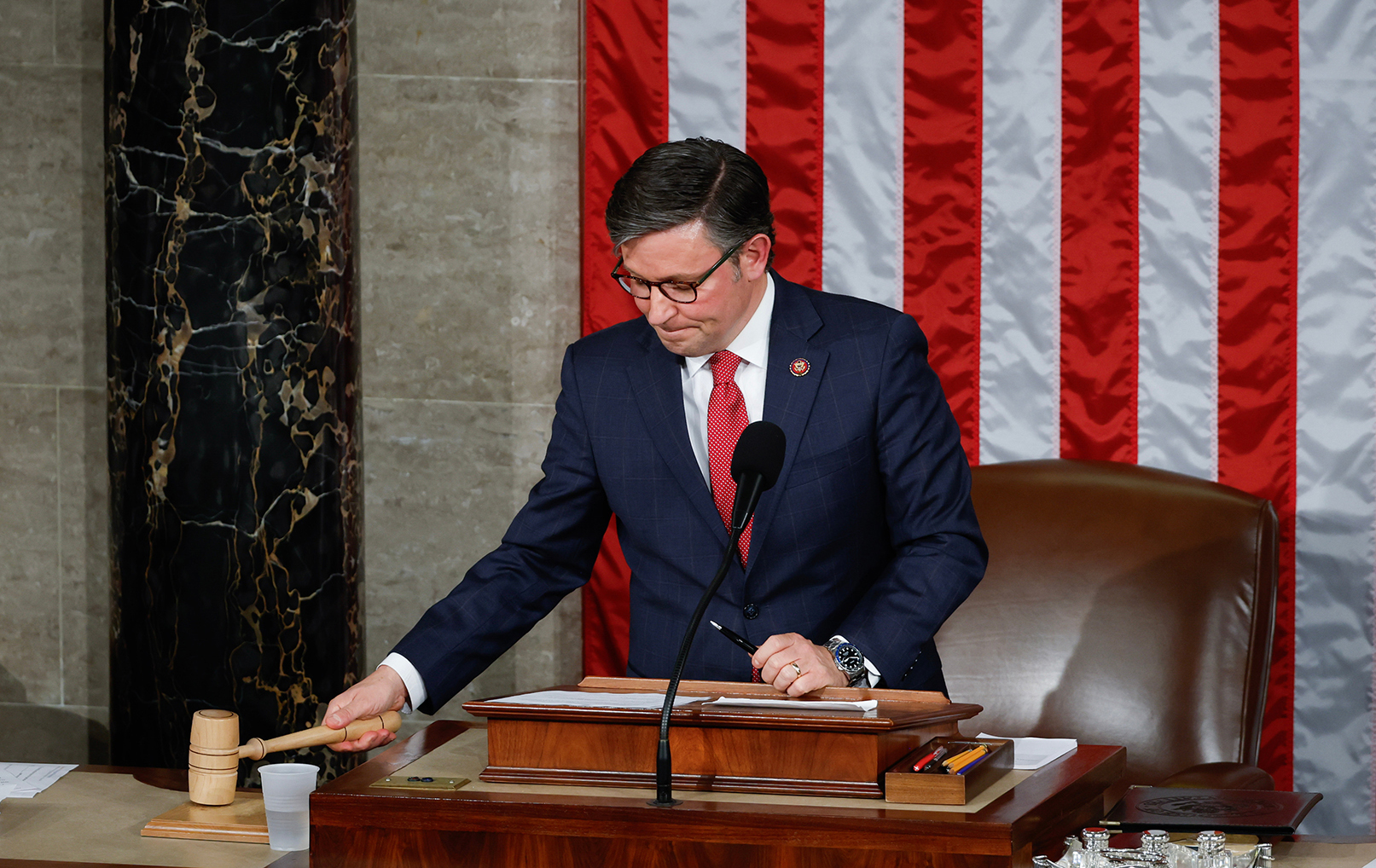US Congress to vote for aid to Ukraine today: What to expect
 Mike Johnson, Speaker of the US House of Representatives (photo: Getty Images)
Mike Johnson, Speaker of the US House of Representatives (photo: Getty Images)
The US House of Representatives will finally vote on allocating funds for Ukraine assistance today, after nearly six months of wrangling, as part of a package of bills initiated by Republican Speaker Mike Johnson. The journey to the vote, what's in the Ukraine-related bills, and whether Congress will approve it, are detailed in the report by RBC-Ukraine.
The preparation of this report included the use of text from Mike Johnson's bill, a statement from Ukrainian Ambassador to the US Oksana Markarova, and articles from Politico, The Hill, The New York Times, The Washington Post, and Axios.
Contents
History of the question
The saga of allocating American aid to Ukraine has been ongoing for half a year now. From the outset, President Joe Biden submitted a bill to Congress where the Ukrainian aid package was combined with assistance to Israel and Taiwan. Additionally, to appease Republican interests, which hold the majority in the House of Representatives, provisions were added to tackle illegal migration.
However, according to Republicans, the proposed provisions did not address the issue of mass migration across the US-Mexico border. The border issue became a stumbling block, delaying Ukrainian aid for several months.
Ultimately, in February, the Democrat-controlled Senate passed a different bill that combined aid to Ukraine, Israel, and Taiwan without addressing the border issue at all.
Republicans received it hostilely; House Speaker Mike Johnson immediately stated that he would not bring it to a vote.
A significant turning point was Iran's attack on Israel on the night of April 13-14. This highlighted the idea that the US should support its allies.
Finally, on the evening of April 15, Speaker Johnson announced the introduction of a package of bills, separately addressing aid to Ukraine, Israel, and Taiwan, as well as a wide range of other national security issues, from sanctions against Iran to the banning of TikTok and the confiscation of Russian assets. The border reinforcement issue with Mexico was put into a separate project.
A key moment was that in terms of security assistance, this package was almost identical to the one passed by the Senate in February. Thus, reservations from the White House and Democrats in Congress were lifted, and they agreed to this version.
Another important detail is that financial assistance to Ukraine will not be provided as a grant but as a loan (although with the possibility of its full forgiveness in the future). This approach was insisted upon by former US President Donald Trump, and its inclusion in the bill allayed concerns among many of his supporters in Congress.
However, not everyone was satisfied; for instance, ultra-radical Trumpist Marjorie Taylor Greene stated that she would raise the issue of Johnson's resignation, accusing him of "advancing the Democratic Party's agenda." However, Johnson will likely be saved from resignation by the same Democrats - essentially in exchange for the speaker's decision to ultimately bring Ukrainian aid to the House floor for a vote.
For Ukraine, the most important thing is that all issues regarding Johnson's speakership will be addressed after the House of Representatives votes on aid to Ukraine.

What's in the Ukrainian package
According to Johnson's "Ukrainian" bill, assistance to Ukraine and related expenses are estimated at $60.84 billion. It's worth noting that over a third of these funds ($23.2 billion) will effectively remain in the United States, as they will be spent on replenishing American armaments and supplies transferred to Ukraine.
The rest of the funds allocated by the bill will be distributed as follows: $13.8 billion will go towards purchasing advanced weapons systems, defense products, and defense services for Ukraine, $11.3 billion will be spent on ongoing US military operations in Europe, and an additional $26 million will be allocated for the continuation of oversight and accountability for the assistance provided to Ukraine.
These are not all the funds Ukraine will receive as part of Johnson's initiative. The bill also includes direct financial assistance to the Ukrainian budget amounting to $7.85 billion. However, there's a catch — it's a loan.
But things are not so straightforward here. The bill proposed by Johnson also allows for the possibility of forgiving this loan by the President, but only after November 5th — when elections are scheduled to take place in the United States. Thus, the decision on loan forgiveness will directly depend on the results of the American people's vote.
In the event of Biden's re-election for a second term, Ukrainians are unlikely to worry about loan forgiveness. The situation differs with Trump, who has a fairly high chance of returning to the presidential seat and has repeatedly stated that assistance to Ukraine should not be a "gift". However, of course, everything can change.
Moreover, Johnson included a provision in his bill prohibiting the Ukrainian government from using these funds for pension payments.
Another interesting point in the bill is the requirement for the US President to immediately transfer long-range ATACMS missiles to Ukraine. However, there's a loophole for Biden in this matter. As stated in the document, the President can refuse to transfer ATACMS if such a transfer would harm US national interests.
If Biden refuses, he will be obliged to officially notify the defense committees of Congress, the Senate Appropriations and Foreign Relations Committees, and the House Appropriations and Foreign Relations Committees. Since some of these committees are controlled by Republicans, it's unlikely they would keep the Democrat president's refusal a secret. In short, refusing to provide ATACMS to Ukrainians could negatively impact Biden's ratings.
In another bill on US national security matters, Johnson proposed the adoption of the so-called REPO Act, which allows the US President to transfer seized Russian assets to Ukraine.
As explained by Ukrainian Ambassador to the US Oksana Markarova, the document stipulates that no later than 90 days after its adoption, the US President must submit a report to Congress listing every individual and legal entity subject to EU and UK sanctions.
It is expected that this bill will enable Ukraine to receive up to $8 billion in Russian assets seized in the US.
 Today, the House of Representatives will vote on aid to Ukraine (photo: Getty Images)
Today, the House of Representatives will vote on aid to Ukraine (photo: Getty Images)
Are there votes and what's next
On Thursday, April 18th, the House of Representatives voted on the rules for considering the foreign aid package. The decision was taken with a confident majority: 319 "for" and 94 "against," supported by both Republican and Democratic factions.
This vote served as a kind of litmus test for the real sentiments among congressmen — and its results confirmed that there is ample support for assistance to Ukraine.
Today, the House of Representatives will begin its session at 4:00 p.m. Kyiv time. The bill regarding aid to Ukraine is currently third in line for consideration. Among all the proposed amendments, only four will be brought to the session hall for discussion, with 10 minutes allotted for each — so the "amendment spam" shouldn't significantly delay the process.
The decisive votes for all bills are scheduled for 8:00-8:30 p.m. Kyiv time.
However, the story of allocating aid to Ukraine will not conclude with the House of Representatives vote. The final approval will still need to come from the Senate. However, the overwhelming majority of senators support both aid to Ukraine and other projects within the security package.
Currently, according to the schedule, senators have a break in their session work, but an extraordinary session may be called over the weekend. Eventually, considering the procedural norms, the Senate will make final decisions on aid allocation over the next few days. President Biden, as expected, will sign the bills literally within a couple of hours after their approval by the Senate.
The White House has promised that arms shipments to Ukraine will begin immediately thereafter. According to Politico, this may include artillery and air defense systems.

